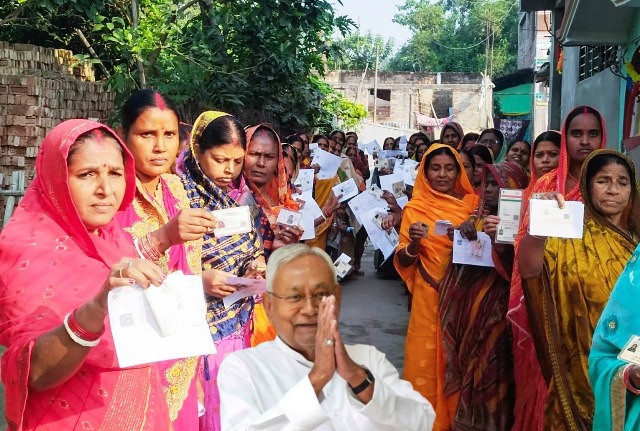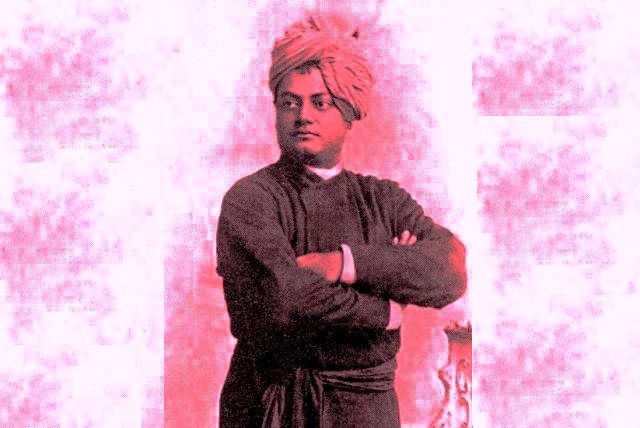
Women Voters Bedrock of Nitish Kumar’s Historic Win
As Nitish Kumar prepares to form his next government, the real architecture of his victory is laid not in grand speeches or alliance maneuvers, but in the long, steady cultivation of women as a political force. The 2025 assembly poll was, in many ways, a gender payback moment. Women turned out, voted, and delivered for the man who long championed their cause.
In doing so, they reaffirmed that in Bihar’s politics, the “debt” Nitish owed was not a liability but an investment and now, thanks to them, it has been repaid in full. If a political leader consistently invests in women, not symbolically but structurally, women respond with extraordinary loyalty.
Nitish’s win is not simply the victory of a coalition. It is the victory of a strategy, one that prioritised gender over caste, inclusion over identity, stability over rhetoric.
The lesson is profound that in modern Indian politics, women are no longer a passive constituency. They are the most reliable architects of power. Nitish Kumar owes his 2025 victory not to alliance arithmetic, not to political maneuvering, but to the silent, disciplined, determined assertion of women.
They paid back his debt and in doing so, they reshaped the electoral landscape of Bihar. When the results came in, the pattern was crystal clear. Constituencies where women voted in large numbers tilted heavily toward the NDA. Booth-level data showed a dramatic skew, where women outnumbered men, the NDA’s vote share spiked.
Younger women, the first-time voters, embraced Nitish’s governance record more enthusiastically than any other demographic. The verdict is not just a political endorsement. It is a settlement of accounts. Women returned the favour to Nitish Kumar not with slogans, not with rallies, but with the most potent democratic instrument that is their vote.
Nitish’s governance playbook has long centered around women-focused welfare. His administration has steadily layered policies that speak to the daily lives of women not just as voters, but as family anchors, economic units, and social agents. A few pillars of this strategy are:
Prohibition (Liquor Ban): Since 2016, Bihar has enforced a statewide liquor ban, a move that Nitish has often framed as a women-centric reform. Many women, particularly in rural areas, credit the ban with reducing domestic violence and curbing household alcohol expenditure.
Economic Empowerment: The Mukhya Mantri Mahila Rozgar Yojana has been a linchpin. In advance of elections, the government disbursed ₹10,000 directly into the accounts of over a crore women, enabling micro-enterprise or self-employment. The promise of further capital support (up to ₹2 lakh) for business ideas that scale only deepened the appeal.
Political Inclusion: Over the years, Nitish’s government instituted 50% reservation for women in panchayats and urban local bodies, and 35% reservation for women in state jobs.
Education and Social Welfare: From free bicycles for schoolgirls, uniforms, scholarships, to the expansive Jeevika self-help group network, Nitish’s policies have intertwined with women’s everyday lives in Bihar.
This was not transactional campaigning, a social contract, crafted over years. Nitish addressed their woes, women were rewarded; in return, they showed up, again and again.
One of the most consequential miscalculations came from Prashant Kishor’s Jan Suraaj Party, which made repealing prohibition a central plank of its campaign. While this might have appealed to voters frustrated by illicit liquor markets or revenue shortfalls, it did not go down well with a large swath of women.
Critically, Kishor’s promise to lift the ban arguably alienated the demographic that had long been the NDA’s bedrock, the women voters who saw prohibition not as a burden but as protection. The opposition underestimated not just the political salience of the ban, but the depth of its emotional resonance among women, especially in rural areas.
In that sense, the NDA’s gamble paid off, women did not look beyond Nitish when choosing whom to trust. The ₹10,000 transfers played a symbolic and strategic role. For a substantial portion of women, this cash was not just income; it was empowerment, a political acknowledgement, and a tangible expression of value.
By aligning financial incentives, social reform, and political inclusion, Nitish and his allies managed to convert what might have been a demographic asset into an electoral juggernaut. The 2025 Bihar election offers broader lessons beyond state politics.
First, Gender-based politics can outlast caste-based alignments. Nitish’s investment in women has proven more stable, more reliable, and more durable than many traditional caste coalitions.
Second, welfare isn’t just charity. When welfare programs are woven into a coherent political narrative, they become a means of empowerment — and a source of political capital.
Lastly, policy wins need not be headline-grabbing. Prohibition might not be glamorous, but its social impact can translate into electoral gold when understood and framed as part of a moral and social reform.
(Sidharth Mishra is an author, academic and president of the Centre for Reforms, Development & Justice)
जनादेश-2025: बढ़ता बिहार, बदलता बिहार, नहीं बदलेगा नेतृत्व फिर से नीतिशे सरकार!
बिहार के शिल्पकार मुख्यमंत्री श्री नीतीश कुमार की बेदाग छवि और कुशल नेतृत्व पर जनता का अटूट भरोसा बीस साल बाद भी बरकरार है, यह विधानसभा चुनाव 2025 के नतीजों ने साबित कर दिया है| प्रचंड जनादेश के साथ प्रदेश की जनता ने एन0डी0ए0 की झोली में 202 सीटें डालकर मुख्यमंत्री श्री नीतीश कुमार के विकास पर पुनः अपनी मुहर लगा दी है| इसका प्रतिफल है कि 20 नवम्बर को पटना के ऐतिहासिक गांधी मैदान में श्री नीतीश कुमार रिकॉर्ड 10 वीं बार मुख्यमंत्री पद की शपथ लेंगे| यह शपथ बिहार के विकास को और आगे बढ़ाने, राज्य में अमन-चैन कायम रखने के साथ ही मेनिफेस्टो में किए गए वादों को अक्षरशः लागू करने का होगा|
विगत दो दशक के अपने कार्यकाल में विकास कार्यों एवं एवं लॉं एंड ऑर्डर कायम कर मुख्यमंत्री श्री नीतीश कुमार “सुशासन बाबू” के पर्याय बने| बीमारू बिहार को विकसित प्रदेश बनाने के लिए एक के बाद एक कर कई ऐतिहासिक फैसले लिए, जनकल्याणकारी योजनाओं का संचालन किया तथा बुनियादी सुविधाओं को जन-जन तक पहुंचाने में अनवरत जुटे रहें| यही कारण है कि बिहार का बजट 24 हजार करोड़ रुपए से बढ़कर वर्तमान वित्तीय वर्ष में 3 लाख 16 हजार करोड़ रुपए से भी अधिक हो गया| वर्ष 2005 में बिहार की बागडोर संभालने के साथ ही नीतीश सरकार ने सुशासन के कार्यक्रमों का खाका खींचकर उसपर दृढ़तापूर्वक अमल किया जिसका नतीजा जगजाहिर है| महिला सशक्तिकरण की दिशा में पंचायती राज संस्थाओं, नगर निकाय के चुनाव तथा प्राथमिक शिक्षक की बहाली में महिलाओं को 50 प्रतिशत आरक्षण का प्रावधान लागू करने जैसे कई क्रांतिकारी कदम उठाए|
न्याय के साथ विकास और सुशासन को स्थापित करने के लिए मुख्यमंत्री श्री नीतीश कुमार ने पुलिस बल की संख्या बढ़ाने के साथ ही उन्हें अत्याधुनिक सुविधाओं तथा साजो-सामान से सुसज्जित कराया| वर्ष 2005 से पहले के बिहार में लोग अपने घरों से बाहर निकलने में डरते थे जबकि अब कभी भी, कही भी लोग बेखौफ होकर अपनी आवश्यकतानुरूप आवागमन कर रहे हैं| अब राज्य में चहुओर आपसी भाईचारा और सौहार्द का माहौल कायम है| राज्य की पहली जवाबदेही शांति व्यवस्था बहाल करने की होती है जिसे श्री नीतीश कुमार ने सिर्फ स्थापित ही नहीं किया बल्कि हर सूरतेहाल में विगत दो दशक से इसे कायम रखने में भी कामयाब रहें हैं| यही कारण है कि अपराध, अपहरण, फिरौती, लूट, हत्या, नरसंहार की पहचान बने बिहार की छवि निरंतर सुधरती और निखरती रही, अब बिहारी पहचान अपमान का नहीं सम्मान का विषय बन चुका है|
बिहार की बागडोर संभालते ही मुख्यमंत्री श्री नीतीश कुमार ने शिक्षा, स्वास्थ्य, बिजली आपूर्ति, सड़क, पुल-पुलियों के निर्माण सहित जनहित से जुड़े हर जरूरी क्षेत्रों में विकास का काम कराया जा रहा है जिसका असर साफ तौर पर देखा जा सकता है| विद्या और विद्यालय की पहुँच से दूर रहनेवाले 12.5 प्रतिशत बच्चों को शत प्रतिशत स्कूलों में नामांकित कराने हेतु कई कार्यक्रम शुरू किए गए| इस कड़ी में स्कूल चलो कार्यक्रम, प्रयास केंद्र, मकतब मदरसा नवाचारी केंद्र, तालीमी मरकज केंद्र, उत्थान केंद्र एवं उत्प्रेरण केंद्र खोलने सहित अन्य महत्वपूर्ण पहल शुरू की गयी| सरकारी विद्यालयों में विद्यार्थियों की संख्या बढ़ाने के लिए पोशाक योजना, पुस्तक वितरण की व्यवस्था, साइकिल योजना, मध्याहन भोजन जैसी अन्य महत्वपूर्ण योजनायें चलायी गयी| बड़े पैमाने पर बहाली कर शिक्षकों की संख्या में काफी वृद्धि की गयी| सात निश्चय योजना के माध्यम से काफी कम समय में 50 लाख लोगों को नौकरी एवं रोजगार मुहैया कराया गया| प्रारम्भ से ही पिछड़ा, अतिपिछड़ा, अनुसूचित जाति/जनजाति, दलित, महादलित, सवर्णो, अल्पसंख्यकों, महिलाओं तथा युवाओं को आगे बढ़ाने की दिशा में हरसंभव प्रयास किया जा रहा है|
“हम न किसी को फंसाते हैं और न बचाते हैं” मुख्यमंत्री श्री नीतीश कुमार के इस फॉर्मूले को अपनाकर जीरो टोलेरेंस की नीति के तहत भ्रष्टाचार के विरुद्ध कई बड़ी कार्रवाई की गयी| गलत ढ़ंग से धनोपाजर्न करने, रंगे हाथों रिश्वत लेते पकड़े जानेवाले तथा पद का दुरुपयोग करनेवालों के विरुद्ध कड़ी कानूनी कार्रवाई की गयी| श्री नीतीश कुमार ने ‘जनता के दरबार में मुख्यमंत्री’ कार्यक्रम आयोजित कर बड़ी संख्या में जन-शिकायतों का ऑन स्पॉट निपटारा किया| बड़ी संख्या में सड़कों तथा पुल-पुलियों का निर्माण किया गया| बिजली आपूर्ति की स्थिति में सुधार लाने के लिए अक्टूबर 2012 में राज्य विद्युत बोर्ड को समाप्त कर पांच विद्युत कंपनिया बनाई गई और अक्टूबर 2018 को प्रदेश के हर इच्छुक व्यक्ति तक बिजली पहुंचा दी गयी| विद्युत आपूर्ति हेतु जर्जर तारों को बदलने, बिजली की चोरी करनेवालों के खिलाफ कानूनी कार्रवाई कर बिजली चोरी की घटनाएँ पूर्णतः रोकने की कोशिश की गयी और अनुदानित दर पर लोगों को बिजली मुहैया कराई जाने लगी| अब तो बिहार के सभी घरेलू उपभोक्ताओं को फ्री बिजली उपलब्ध कराई जा रही है| इस तरह लालटेन की टिमटिमाती रोशनी से बाहर निकालकर श्री नीतीश कुमार ने बिहार को समुचित विकास और पर्याप्त प्रकाश से जगमग कर दिया|
मुख्यमंत्री श्री नीतीश कुमार के सत्तासीन होते ही निचले स्तर तक के सरकारी अस्पतालों में पर्याप्त संख्या में चिकित्सकों की तैनाती, निःशुल्क दवा वितरण, पर्याप्त संख्या में एंबुलेंस की उपलब्धता आदि की व्यवस्था तथा उसकी मॉनिटरिंग शुरू की गयी| मेडिकल कॉलेज एवं अस्पतालों से लेकर प्राथमिक स्वास्थ्य केन्द्रों में ससमय इलाज की सुविधा सुनिश्चित कराई गयी| जिला अस्पतालों में 24 घंटे आपात चिकित्सा सुविधा, नियमित टीकाकरण, ब्लड बैंक की स्थापना जैसी हर आवश्यक पहल की गयी| इस कारण ससमय तथा निःशुल्क इलाज लोगों को मिलने लगा| स्वास्थ्य के प्रति लोगों को जागरूक करने हेतु अभियान शुरू किए गए जिसके फलस्वरूप प्रजनन दर, शिशु मृत्यु दर तथा मातृ मृत्यु दर में काफी गिरावट दर्ज की गयी| महिलाओं को आत्मनिर्भर बनाने के लिए मुख्यमंत्री महिला रोजगार योजना शुरू की गयी| इतना ही नहीं रोजगार शुरू करने के लिए प्रत्येक महिला के खाते में राज्य सरकार की तरफ से 10 हजार रुपया भी भेजा गया| सामाजिक सुरक्षा पेंशन योजना से आच्छादित सभी वृद्धजनों, विधवा एवं दिव्यांगजनों को मिलनेवाली पेंशन की राशि 400 रुपए से बढ़ाकर 1100 रुपए किया गया|
इस प्रकार विगत 20 वर्षों के अपने कार्यकाल में मुख्यमंत्री श्री नीतीश कुमार ने सभी वर्गों का ख्याल रखते हुए बिना किसी भेदभाव के हर क्षेत्र में विकास का काम कराया और जनता का भरोसा दो दशक बाद भी जीतने में सफल रहे| श्री नीतीश कुमार के नेतृत्व को लेकर गढ़े गए नारे (“25 से 30, फिर से नीतीश”) से दो कदम आगे बढ़कर बिहार की जनता ने बिहार विधानसभा की 243 सीटों में एन0डी0ए0 को 200 के पार पहुंचा दिया| इस बार के जनादेश ने भी स्पष्ट कर दिया है कि बढ़ता बिहार, बदलता बिहार, नहीं बदलेगा नेतृत्व फिर से नीतिशे सरकार!



